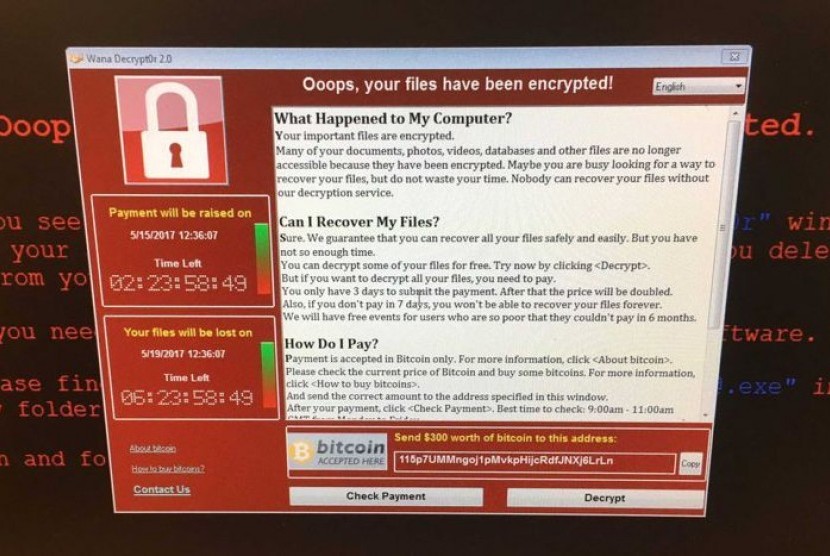REPUBLIKA.CO.ID, LONDON -- A huge extortion cyberattack has hit dozens of nations, holding computer data for ransom at hospitals, telecommunications firms and other companies.
The attack appeared to exploit a vulnerability purportedly identified for use by the US National Security Agency and later leaked to the internet.
The attack hit Britain's health service, forcing affected hospitals to close wards and emergency rooms. Related attacks were reported in Spain, Portugal and Russia.
Two security firms, Kaspersky Lab and Avast, said they had identified the malware behind the attack in upward of 70 countries, although both said the attack had hit Russia hardest.
The Russian Interior Ministry has confirmed it was hit by the "ransomware" attack, which encrypts data on infected computers and demands payment, usually via the digital currency bitcoin, to release it.
Britain's health service was also hit hard as the attack froze computers at hospitals across the country, shutting down wards, closing emergency rooms and bringing medical treatments to a halt.
Hospitals in London, northwest England and other parts of the country reported problems and asked patients not to come to hospitals unless it was an emergency.
Many cancelled all routine procedures and some chemotherapy patients were even sent home because their records could not be accessed.
Most of the affected hospitals were in England, but several facilities in Scotland also reported being hit. Doctors' practices and pharmacies reported similar problems.
Expert believes attack was not targeted
As similar widespread ransomware attacks were reported in Spain, Romania and elsewhere, experts warned online extortion attempts by hackers are a growing menace.
Hospitals, with their often outdated IT systems and trove of confidential patient data, are a particularly tempting target.
British Prime Minister Theresa May said there was no evidence that patient data had been compromised in the attack, and that it had not specifically targeted the National Health Service (NHS).
"It's an international attack and a number of countries and organisations have been affected," she said.
NHS Digital, which oversees hospital cybersecurity, said the attack was affecting organisations from across a range of sectors." It initially said 16 NHS organisations had reported being hit, and more reports came in as the day went on.
NHS Digital said the attack used the Wanna Decryptor variant of malware, which infects and locks computers while the attackers demand a ransom.
Pictures posted on social media showed screens of NHS computers with images demanding payment of $300 worth of the online currency Bitcoin, saying: "Ooops, your files have been encrypted!
Alan Woodward, visiting professor of computing at the University of Surrey, said there was evidence the ransomware was spreading using a Microsoft flaw exposed in a US security leak.
He said the affected computers likely had not applied the Microsoft patch or were running old operating systems for which no patch was available.
"I don't believe it will have been a targeted attack, but will simply have been that the ransomware has sought out those organisations that are running susceptible devices," Woodward said.
Spain also hit by 'massive infection'
Spain, meanwhile, activated a special protocol to protect critical infrastructure in response to the "massive infection" of personal and corporate computers in ransomware attacks.
The National Centre for the Protection of Critical Infrastructure said it was communicating with more than 100 providers of energy, transportation, telecommunications and financial services about the attack.
The Spanish government said several companies had been targeted in ransomware cyberattack that affected the Windows operating system of employees' computers.
It said the attacks were carried out with a version of WannaCry ransomware that encrypted files and prompted a demand for money transfers to free up the system.
Spain's Telefonica was among the companies hit.
Britain's National Cyber Security Centre, part of the GCHQ electronic intelligence agency, said it was working with police and the health system to investigate the attack.
British government officials and intelligence chiefs have repeatedly highlighted the threat to critical infrastructure and the economy from cyberattacks.
The National Cyber Security Centre said it had detected 188 "high-level" attacks in just three months.


